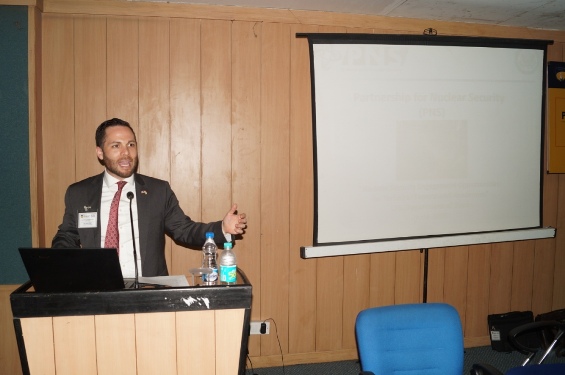01 Jun 2015|Noida | Amity Campus
Experts from King’s College, London and Amity deliberate on “Internal Threats to Nuclear Security”

Academicians, Scientists and Researchers from renowned Institutions across India including Panjab University, Nagpur University, Indian Institute of Technology, Roorkee, IGNOU, Delhi University have gathered at Amity University Campus, Noida to attend “Professional Development Course (PDC) on Nuclear Security Education 2015” organized from June 1-5, 2015 by Amity Institute of Nuclear Science and Technology, Amity University, in collaboration with Centre for Science and Security Sciences,King’s College, London and Partnership for Nuclear Security (PNS) US,Washington D C.
The PDC aims to explore insider threats to nuclear facilities,preventive and protection measures that could be taken to mitigate the risks involved and assess the impact of security culture on their effectiveness.
Welcoming the distinguished guests, Dr. Alpana Goel –Deputy Director and Head, Amity Institute of Nuclear Science and Technology, Amity University presented a bird’s eye view of the PDC and outlined the key topics that will be covered during the PDC such as“Threats to Nuclear Security and Consequences”, “Insider Threat and Strategies to manage Insider risk”, “Nuclear Security Culture and its role in risk reduction”, “International and National Nuclear Security Regime”, “Deployable Radiation Detection Technologies in Nuclear Security”, “Transportation Security” and “Access Control and Contraband Detection”.
Addressing the gathering and giving a brief overview of PNS, Mr. Daniel Miller- Program Officer,U.S. Department of State's Partnership for Nuclear Security said that PNS seeks to strengthen nuclear security culture in partner countries’ nuclear technical organizations in order to mitigate the risk which an insider could cause by diverting nuclear material, technology, or expertise for malicious purposes. He stressed that “Insider threats” present a unique problem since Insiders could take advantage of their access (i.e. right or opportunity to gain admittance), complemented by their authority (i.e. power or right to enforce obedience) and knowledge of the facility (i.e. awareness or familiarity gained by training or experience) to bypass dedicated physical protection elements or other provisions such as safety, nuclear material control and accountancy and operating measures and procedures. Suggesting ways to check andreduce the chances of Internal Threats, Mr. Miller said that Nuclear Security Insider Threat Exercise (NSITE) is a Tabletop exercise for operators, regulators, and academics which help them in understanding the effective and ineffective nuclear security culture through critical thinking and discussions. He briefed audience about Nuclear Security Training Series (NSTS) which is a four week study tour for students from various Indian universities at Texas, A&M University Campus, Sandia National Laboratories and Oak Ridge National Laboratory and conclusion at the INMM Annual Meeting in Atlanta.
Sharing his views on “Nuclear Security: Core Principles,International, National and Facility levels”, Dr.Christopher Hobbs- Deputy Director for Knowledge Transfer at the Centre for Science and Security Studies, King’s College London said that Nuclear Security is an intrinsically interdisciplinary subject drawing from Physics, Engineering, Law,Psychology, Social Science, International Law etc. Referring to the definition of Nuclear Security by International Atomic Energy Agency (IAEA), Dr. Hobbs said, “Nuclear Security is the prevention and detection of and response to theft, sabotage, unauthorized access and illegal transfer or other malicious acts involving nuclear material and other radioactive substances and their associated facilities.” He briefed audience with various radioactive substances, their categorization depending upon the hazard, danger or chance of harmful or injurious consequences associated with their actual or potential exposure. He stressed that implementation and assessment of nuclear security measures is the responsibility of Individual nations and it is very importantfor Nations to pay due attention and importance to Nuclear Security.
During the day, three sessions unfolded which included “Nuclear Fuels: Overview” by Prof. AN Garg- Professor Emeritus, AINST, “Nuclear reactor Material” by Prof. H S Sharma, Professor, AINST and “Introduction to Insider Threats (Motivation, Attributes and Advantages) by Mr. Luca Lentini- Kings College, London.